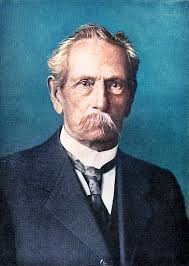THE POWER OF TOUCH
Catagory:Reading
Author:Helen Keller
Posted Date:01/06/2025
Posted By:utopia online
SOME months ago, in a newspaper which announced the publication of the "Matilda Ziegler Magazine for the Blind," appeared the following paragraph:
"Many poems and stories must be omitted because they deal with sight. Allusion to moonbeams, rainbows, starlight, clouds, and beautiful scenery may not be printed, because they serve to emphasize the blind man's sense of his affliction."
That is to say, I may not talk about beautiful mansions and gardens because[46] I am poor. I may not read about Paris and the West Indies because I cannot visit them in their territorial reality. I may not dream of heaven because it is possible that I may never go there. Yet a venturesome spirit impels me to use words of sight and sound whose meaning I can guess only from analogy and fancy. This hazardous game is half the delight, the frolic, of daily life. I glow as I read of splendours which the eye alone can survey. Allusions to moonbeams and clouds do not emphasize the sense of my affliction: they carry my soul beyond affliction's narrow actuality.
Critics delight to tell us what we cannot do. They assume that blindness and deafness sever us completely from the things which the seeing and the hearing enjoy, and hence they assert we have no[47] moral right to talk about beauty, the skies, mountains, the song of birds, and colours. They declare that the very sensations we have from the sense of touch are "vicarious," as though our friends felt the sun for us! They deny a priori what they have not seen and I have felt. Some brave doubters have gone so far even as to deny my existence. In order, therefore, that I may know that I exist, I resort to Descartes's method: "I think, therefore I am." Thus I am metaphysically established, and I throw upon the doubters the burden of proving my non-existence. When we consider how little has been found out about the mind, is it not amazing that any one should presume to define what one can know or cannot know? I admit that there are innumerable marvels in the visible universe[48] unguessed by me. Likewise, O confident critic, there are a myriad sensations perceived by me of which you do not dream.
Necessity gives to the eye a precious power of seeing, and in the same way it gives a precious power of feeling to the whole body. Sometimes it seems as if the very substance of my flesh were so many eyes looking out at will upon a world new created every day. The silence and darkness which are said to shut me in, open my door most hospitably to countless sensations that distract, inform, admonish, and amuse. With my three trusty guides, touch, smell, and taste, I make many excursions into the borderland of experience which is in sight of the city of Light. Nature accommodates itself to every[49] man's necessity. If the eye is maimed, so that it does not see the beauteous face of day, the touch becomes more poignant and discriminating. Nature proceeds through practice to strengthen and augment the remaining senses. For this reason the blind often hear with greater ease and distinctness than other people. The sense of smell becomes almost a new faculty to penetrate the tangle and vagueness of things. Thus, according to an immutable law, the senses assist and reinforce one another.
It is not for me to say whether we see best with the hand or the eye. I only know that the world I see with my fingers is alive, ruddy, and satisfying. Touch brings the blind many sweet certainties which our more fortunate fellows miss, because their sense of touch[50] is uncultivated. When they look at things, they put their hands in their pockets. No doubt that is one reason why their knowledge is often so vague, inaccurate, and useless. It is probable, too, that our knowledge of phenomena beyond the reach of the hand is equally imperfect. But, at all events, we behold them through a golden mist of fantasy.
There is nothing, however, misty or uncertain about what we can touch. Through the sense of touch I know the faces of friends, the illimitable variety of straight and curved lines, all surfaces, the exuberance of the soil, the delicate shapes of flowers, the noble forms of trees, and the range of mighty winds. Besides objects, surfaces, and atmospherical changes, I perceive countless vibrations. I derive much knowledge[51] of everyday matter from the jars and jolts which are to be felt everywhere in the house.
Footsteps, I discover, vary tactually according to the age, the sex, and the manners of the walker. It is impossible to mistake a child's patter for the tread of a grown person. The step of the young man, strong and free, differs from the heavy, sedate tread of the middle-aged, and from the step of the old man, whose feet drag along the floor, or beat it with slow, faltering accents. On a bare floor a girl walks with a rapid, elastic rhythm which is quite distinct from the graver step of the elderly woman. I have laughed over the creak of new shoes and the clatter of a stout maid performing a jig in the kitchen. One day, in the dining-room of an hotel,[52] a tactual dissonance arrested my attention. I sat still and listened with my feet. I found that two waiters were walking back and forth, but not with the same gait. A band was playing, and I could feel the music-waves along the floor. One of the waiters walked in time to the band, graceful and light, while the other disregarded the music and rushed from table to table to the beat of some discord in his own mind. Their steps reminded me of a spirited war-steed harnessed with a cart-horse.
Often footsteps reveal in some measure the character and the mood of the walker. I feel in them firmness and indecision, hurry and deliberation, activity and laziness, fatigue, carelessness, timidity, anger, and sorrow. I am most[53] conscious of these moods and traits in persons with whom I am familiar.
Footsteps are frequently interrupted by certain jars and jerks, so that I know when one kneels, kicks, shakes something, sits down, or gets up. Thus I follow to some extent the actions of people about me and the changes of their postures. Just now a thick, soft patter of bare, padded feet and a slight jolt told me that my dog had jumped on the chair to look out of the window. I do not, however, allow him to go uninvestigated; for occasionally I feel the same motion, and find him, not on the chair, but trespassing on the sofa.
When a carpenter works in the house or in the barn near by, I know by the slanting, up-and-down, toothed vibration, and the ringing concussion of blow[54] upon blow, that he is sawing or hammering. If I am near enough, a certain vibration, travelling back and forth along a wooden surface, brings me the information that he is using a plane.
A slight flutter on the rug tells me that a breeze has blown my papers off the table. A round thump is a signal that a pencil has rolled on the floor. If a book falls, it gives a flat thud. A wooden rap on the balustrade announces that dinner is ready. Many of these vibrations are obliterated out of doors. On a lawn or the road, I can feel only running, stamping, and the rumble of wheels.
By placing my hand on a person's lips and throat, I gain an idea of many specific vibrations, and interpret them: a boy's chuckle, a man's "Whew!" of surprise,[55] the "Hem!" of annoyance or perplexity, the moan of pain, a scream, a whisper, a rasp, a sob, a choke, and a gasp. The utterances of animals, though wordless, are eloquent to me—the cat's purr, its mew, its angry, jerky, scolding spit; the dog's bow-wow of warning or of joyous welcome, its yelp of despair, and its contented snore; the cow's moo; a monkey's chatter; the snort of a horse; the lion's roar, and the terrible snarl of the tiger. Perhaps I ought to add, for the benefit of the critics and doubters who may peruse this essay, that with my own hands I have felt all these sounds. From my childhood to the present day I have availed myself of every opportunity to visit zoological gardens, menageries, and the circus, and all the animals, except the tiger, have[56] talked into my hand. I have touched the tiger only in a museum, where he is as harmless as a lamb. I have, however, heard him talk by putting my hand on the bars of his cage. I have touched several lions in the flesh, and felt them roar royally, like a cataract over rocks.
To continue, I know the plop of liquid in a pitcher. So if I spill my milk, I have not the excuse of ignorance. I am also familiar with the pop of a cork, the sputter of a flame, the tick-tack of the clock, the metallic swing of the windmill, the laboured rise and fall of the pump, the voluminous spurt of the hose, the deceptive tap of the breeze at door and window, and many other vibrations past computing.
There are tactual vibrations which do not belong to skin-touch. They penetrate[57] the skin, the nerves, the bones, like pain, heat, and cold. The beat of a drum smites me through from the chest to the shoulder-blades. The din of the train, the bridge, and grinding machinery retains its "old-man-of-the-sea" grip upon me long after its cause has been left behind. If vibration and motion combine in my touch for any length of time, the earth seems to run away while I stand still. When I step off the train, the platform whirls round, and I find it difficult to walk steadily.
Every atom of my body is a vibroscope. But my sensations are not infallible. I reach out, and my fingers meet something furry, which jumps about, gathers itself together as if to spring, and acts like an animal. I pause a moment for caution. I touch it again[58] more firmly, and find it is a fur coat fluttering and flapping in the wind. To me, as to you, the earth seems motionless, and the sun appears to move; for the rays of the afternoon withdraw more and more, as they touch my face, until the air becomes cool. From this I understand how it is that the shore seems to recede as you sail away from it. Hence I feel no incredulity when you say that parallel lines appear to converge, and the earth and sky to meet. My few senses long ago revealed to me their imperfections and deceptivity.
Not only are the senses deceptive, but numerous usages in our language indicate that people who have five senses find it difficult to keep their functions distinct. I understand that we hear views, see tones, taste music. I am told[59] that voices have colour. Tact, which I have supposed to be a matter of nice perception, turns out to be a matter of taste. Judging from the large use of the word, taste appears to be the most important of all the senses. Taste governs the great and small conventions of life. Certainly the language of the senses is full of contradictions, and my fellows who have five doors to their house are not more surely at home in themselves than I. May I not, then, be excused if this account of my sensations lacks precision?


.jpg)














 👁 :184
👁 :184
 👁 :216
👁 :216
 👁 :234
👁 :234
 👁 :422
👁 :422
 👁 :84
👁 :84
 👁 :142
👁 :142
 👁 :59
👁 :59